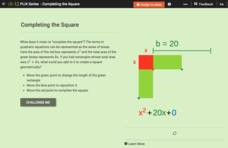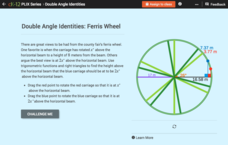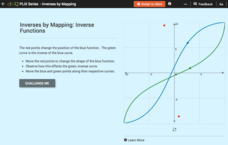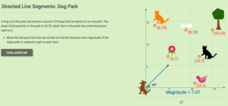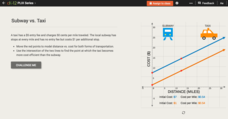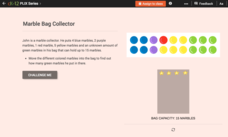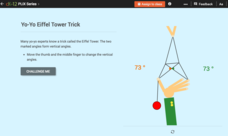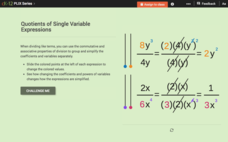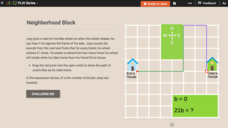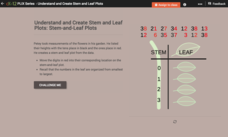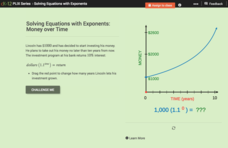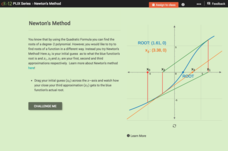West Contra Costa Unified School District
Factoring Quadratic Expressions
Factor in different strategies in a lesson plan for factoring quadratics. Young mathematicians first create tables and area models to factor quadratic trinomials into two binomials by guess and check. Learners then investigate how they...
CK-12 Foundation
Completing the Square
Determine the area of a square with quadratics. Pupils use the interactive to visualize the process of completing the square. Scholars build a square area model to represent a quadratic expression then determine the amount that...
CK-12 Foundation
Fraction Ordering with Lowest Common Denominators: Test Your Strength
Young mathematicians use a bell and hammer to see how high or low the puck goes. Then, they order the fractional values to demonstrate the greatest to lowest hit. Students then respond to several questions that require them to use...
CK-12 Foundation
Double Angle Identities: Ferris Wheel
Use a Ferris wheel to soar to new heights of understanding on double angle identities. Here is an interactive that applies an example of a Ferris wheel to show how doubling the angle does not double the value of a trigonometric ratio....
CK-12 Foundation
Inverses by Mapping: Inverse Functions
Map your way to successfully understanding inverse functions. Pupils use an interactive map to investigate how changes in the graph of a function affect the graph of its inverse. The results of the activity lead to the conclusion that...
CK-12 Foundation
Alternate Formula for the Area of a Triangle: Alternate Area of a Triangle
It's always nice to have a plan B. Pupils investigate an alternate formula for the area of a triangle that uses sine. A set of challenge questions shows how the new formula relates to the well-known formula of (1/2)bh.
CK-12 Foundation
Directed Line Segments: Dog Park
Its a dog's world! Using a vector in standard position, pupils model the path a dog takes to different items in a dog park. The individuals use the interactive to find the magnitude and direction of the directed line segment.
CK-12 Foundation
Seafloor: Sonar Boats
An interactive that teaches about sonar sure sounds like fun! Junior oceanographers study the uses of sonar, past and present, in an engaging interactive. The content demonstrates how sonar works, why sound waves are a great tool...
CK-12 Foundation
Slope-Intercept Form of Linear Equations: Cable Car Tracks
Get on track to learn about slope-intercept form. Scholars use an interactive to position a line along the tracks of cable car. Applying knowledge of slope and intercepts, they write the slope-intercept form of the equation for the line.
CK-12 Foundation
Standard Form of Linear Equations: Seesaw
Don't hem and haw, learn about equations using a seesaw. An easy-to-use interactive has pupils move a seesaw on a coordinate plane to investigate the standard form of a linear equation. By completing a set of challenge questions, they...
CK-12 Foundation
Compound Inequalities: Babysitting
Keep this resource close by. Given conditions on how close by a child must be to a babysitter, scholars use an interactive to position a picture of the child in relation to the babysitter. Compound inequalities help represent the condition.
CK-12 Foundation
Satellites, Shuttles, and Space Stations: Satellites in Orbit
Blast off! How do satellites, space shuttles, and space stations escape Earth's gravity and achieve orbit? Young astronauts study rocket science (literally) with an interactive lesson. They discover the four main uses for satellites, how...
CK-12 Foundation
Problem-Solving Models: Subway vs. Taxi
Ride to success in understanding systems of equations. Scholars graph a system of equations on the cost of a subway and a taxi using an interactive. Using this graph allows users to answer some questions about the situation.
CK-12 Foundation
Mental Math for Addition and Subtraction Equations: Marble Bag Collector
Don't lose your marbles as your learn about addition and subtraction equations. Pupils investigate the relationship between addition and subtraction by using an interactive. They drag different color marbles into a box and identify...
CK-12 Foundation
Vertical Angles: Yo-Yo Eiffel Tower Trick
Yo, yo, learn about vertical angles with a yo-yo. Using an interactive, scholars adjust the position of fingers holding a design from a yo-yo. Answering a set of challenge questions based on the interactive helps clarify understanding of...
CK-12 Foundation
Visual Patterns: Balloons
Balloons aren't just for little kids; they can teach important math concepts, too. Individuals use an interactive to continue a color pattern with balloons. They continue the pattern and write a mathematical expression to represent the...
CK-12 Foundation
Simplify Products or Quotients of Single Variable Expressions: Quotients of Single Variable Expressions
Investigate division within an algebraic term using an inquiry-based lesson. Individuals adjust sliders and watch as the simplification of the term changes. Questions help guide them to important conclusions.
CK-12 Foundation
Single Variable Expressions: Neighborhood Block
The number of bicycle wheel turns is as good as any way to describe the distance from school to home. An interactive lets young mathematicians determine the number of city blocks a person bicycles. They use this information along with an...
CK-12 Foundation
Two-Sided Stem-and-Lead Plots: Gamers
Which gender spends more time playing video games? Your classes use provided data to answer this question. They first build a two-sided stem-and-leaf plot and then use the display to look for patterns. Guiding questions help them...
CK-12 Foundation
Understand and Create Stem-and-Leaf Plots: Stem-and-Leaf Plots
Explore the advantages to using a stem-and-leaf plot using an online lesson. Learners manipulate an animation to create a stem-and-leaf plot. They then calculate statistics for the data using their display. Guiding questions help them...
CK-12 Foundation
Solving Equations with Exponents: Money Over Time
We'd all like to see our money double. An interactive shows how an initial investment of $1,000 will increase using a constant rate of return. Scholars answer a set of challenge questions based on the situation.
CK-12 Foundation
Newton's Method
Does the accuracy of the first guess make a difference down the line? Learners investigate the effects of the iterative process of finding roots, using Newton's Method. By moving the initial guess of a root on a graph, pupils observe the...
New York State Education Department
US History and Government Examination: June 2017
Ready for a test that uses primary sources as a tool to assess comprehension? Learners answer multiple choice, essay, and short answer questions to demonstrate their understanding of American history.
Mathematics Vision Project
Module 8: Probability
It's probably a good idea to use the unit. Young mathematicians learn about conditional probability using Venn diagrams, tree diagrams, and two-way tables. They also take into consideration independence and the addition rules.
Other popular searches
- Addition Using Manipulatives
- Creating Art Using Music
- Chemical Change Using Apples
- Lessons Using Apples
- Multiplying Using Arrays
- Math Using Arctic Animals
- Addition Using Grouping
- Addition Using Unifix Cubes
- Adding Decimals Using Money
- Cultural Studies Using Math
- Add Fractions Using Pictures
- Addition Using Manipulative's

